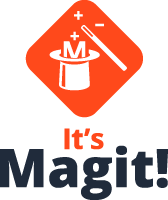homepage | manual | faq | wiki | mastodon
Magit is an interface to the version control system Git, implemented as an Emacs package. Magit aspires to be a complete Git porcelain. While we cannot (yet) claim that Magit wraps and improves upon each and every Git command, it is complete enough to allow even experienced Git users to perform almost all of their daily version control tasks directly from within Emacs. While many fine Git clients exist, only Magit and Git itself deserve to be called porcelains.
more productive too, then please consider making a donation.
If you are new to Magit, then either one of the following two articles should help understanding how it differs from other Git clients.
If you are completely new to Magit, then this article is a good visual introduction.
Almost everything that you see in Magit can be acted on by pressing some key, but that's not obvious from just seeing how Magit looks. The screenshots and accompanying text of this article explain how to perform a variety of actions on Magit's output.
Magit differs significantly from other Git interfaces, and its advantages are not immediately obvious simply from looking at a few screenshots as presented in the preceding article.
This article discusses Magit's properties in somewhat more abstract terms.
If you prefer video introductions, head over to that page, where find a collection of such introductions and other videos about Magit, by various creators.
Magit has many users and very few maintainers, so we kindly ask to read the appropriate guidelines before getting in contact. — Thanks!
- 🆘 How to ask for help
- 🪳 How to report a bug
- 💡 How to suggest a feature
- 🏗️ Pull request guidelines
- ℹ️ FAQ
- ℹ️ Manual
TL;DR We now use discussions for feature requests (not issues) and prefer if you ask the community for support instead of the overworked maintainers.
Please also consider to contribute by supporting other users or by making a monetary donation. — Thanks!
Magit was started by Marius Vollmer, and is now maintained by Jonas Bernoulli and Kyle Meyer. Former maintainers are Nicolas Dudebout, Noam Postavsky, Peter J. Weisberg, Phil Jackson, Rémi Vanicat and Yann Hodique. Many more people have contributed code, suggested features or made monetary contributions.
Thanks to all of you, may (the history of) the source be with you!





